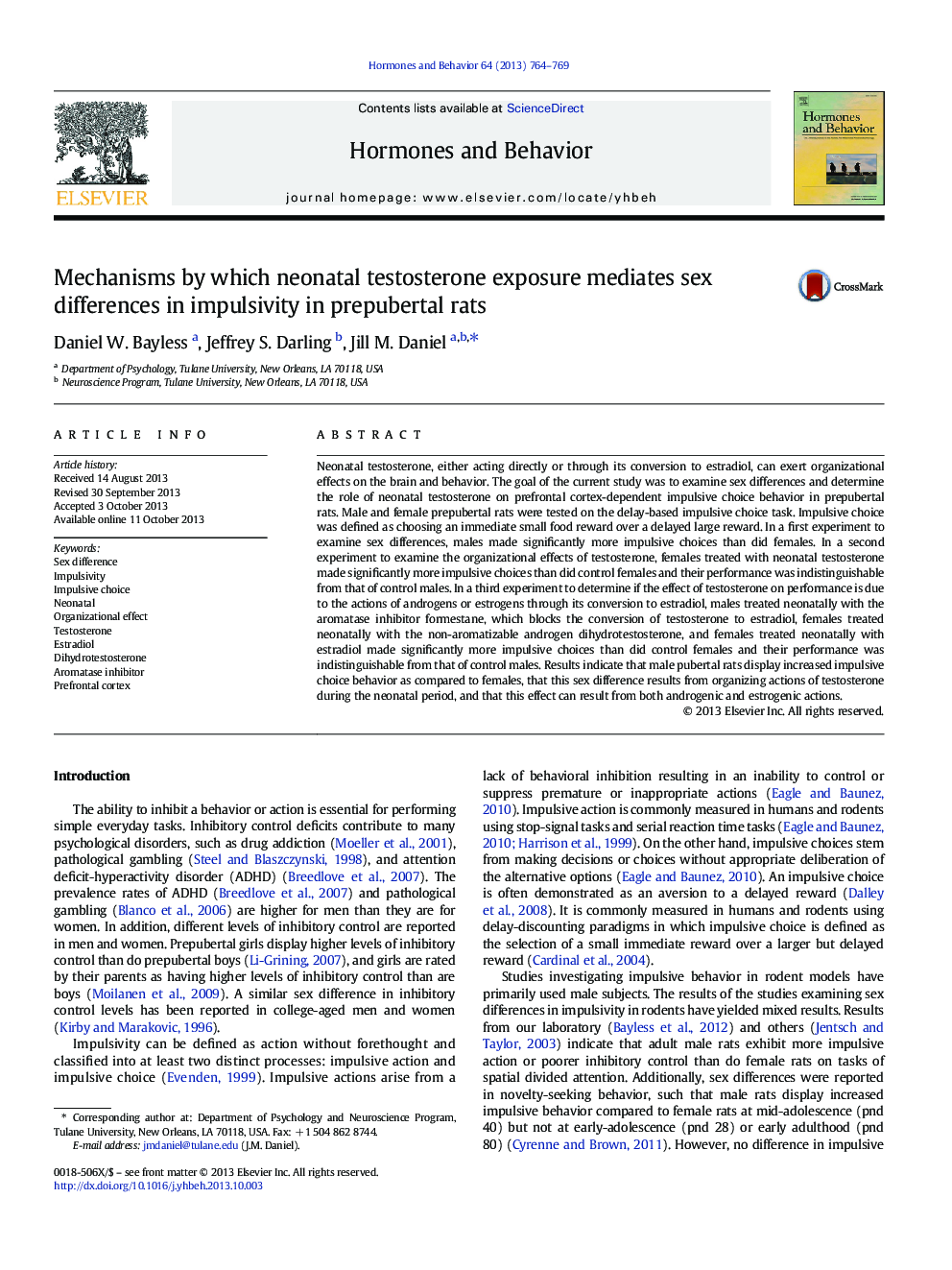| کد مقاله | کد نشریه | سال انتشار | مقاله انگلیسی | نسخه تمام متن |
|---|---|---|---|---|
| 10301076 | 540656 | 2013 | 6 صفحه PDF | دانلود رایگان |
عنوان انگلیسی مقاله ISI
Mechanisms by which neonatal testosterone exposure mediates sex differences in impulsivity in prepubertal rats
ترجمه فارسی عنوان
مکانیسم هایی که قرار گرفتن در معرض قرار گرفتن تستوسترون نوزادان، تفاوت جنسی در تکانشی در موش های پیش دبستانی را متاثر می کند
دانلود مقاله + سفارش ترجمه
دانلود مقاله ISI انگلیسی
رایگان برای ایرانیان
کلمات کلیدی
ترجمه چکیده
تستوسترون نوزاد، به طور مستقیم یا از طریق تبدیل به استرادیول، می تواند اثرات سازمانی بر مغز و رفتار اعمال کند. هدف از مطالعه حاضر، بررسی تفاوتهای جنسیتی و تعیین نقش تستوسترون نوزاد در رفتار انتخابی وابسته به قشر پیش از موش صحرایی در موشهای پیش دبستانی بود. موش های صحرایی نر و ماده بر روی کار انتخابی تکانشی مبتنی بر تاخیر آزمایش شده اند. انتخاب انبساطی به عنوان انتخاب یک فنجان کوچک غذای کم بیش از پاداش بزرگ تاخیر تعریف شد. در یک آزمایش اول برای بررسی تفاوت های جنسی، مردان انتخاب های مبهم بیشتری را نسبت به زنان انجام دادند. در آزمایش دوم برای بررسی تأثیرات سازمانی تستوسترون، زنان مبتلا به تستوسترون نوزادان، انتخابهای محوری بیشتری را نسبت به زنان کنترل داشتند و عملکردشان از مردان کنترل بیشتر قابل تشخیص نبود. در یک آزمایش سوم برای تعیین اینکه آیا اثر تستوسترون بر عملکرد به علت اقدامات آندروژن ها یا استروژن ها از طریق تبدیل به استرادیول است، مردان مبتلا به نوزادان مبتلا به مهار کننده آروماتاز، فرمستن، که بلوک تبدیل تستوسترون به استرادیول، زنان تحت درمان با نوزادان دی هیدروتستوسترون آندروژن غیر آروماتیزه و زنان مبتلا به ادرار با نوزادان از نظر استرویید، انتخاب های مؤثرتری را نسبت به کنترل زنان انجام می داد و عملکرد آنها نسبت به مردان کنترل کننده قابل تشخیص نبود. نتایج نشان می دهد که موش های صحرایی نابالغ در مقایسه با زنان نسبت به زنان به افزایش رفتار انتخابی ناگهانی نمایش داده می شود که این تفاوت جنسیتی از تجمع تستوسترون در طی دوره نوزادان حاصل می شود و این اثر می تواند منجر به فعالیت های آندروژنیک و استروژنیک شود.
موضوعات مرتبط
علوم زیستی و بیوفناوری
بیوشیمی، ژنتیک و زیست شناسی مولکولی
علوم غدد
چکیده انگلیسی
Neonatal testosterone, either acting directly or through its conversion to estradiol, can exert organizational effects on the brain and behavior. The goal of the current study was to examine sex differences and determine the role of neonatal testosterone on prefrontal cortex-dependent impulsive choice behavior in prepubertal rats. Male and female prepubertal rats were tested on the delay-based impulsive choice task. Impulsive choice was defined as choosing an immediate small food reward over a delayed large reward. In a first experiment to examine sex differences, males made significantly more impulsive choices than did females. In a second experiment to examine the organizational effects of testosterone, females treated with neonatal testosterone made significantly more impulsive choices than did control females and their performance was indistinguishable from that of control males. In a third experiment to determine if the effect of testosterone on performance is due to the actions of androgens or estrogens through its conversion to estradiol, males treated neonatally with the aromatase inhibitor formestane, which blocks the conversion of testosterone to estradiol, females treated neonatally with the non-aromatizable androgen dihydrotestosterone, and females treated neonatally with estradiol made significantly more impulsive choices than did control females and their performance was indistinguishable from that of control males. Results indicate that male pubertal rats display increased impulsive choice behavior as compared to females, that this sex difference results from organizing actions of testosterone during the neonatal period, and that this effect can result from both androgenic and estrogenic actions.
ناشر
Database: Elsevier - ScienceDirect (ساینس دایرکت)
Journal: Hormones and Behavior - Volume 64, Issue 5, November 2013, Pages 764-769
Journal: Hormones and Behavior - Volume 64, Issue 5, November 2013, Pages 764-769
نویسندگان
Daniel W. Bayless, Jeffrey S. Darling, Jill M. Daniel,
